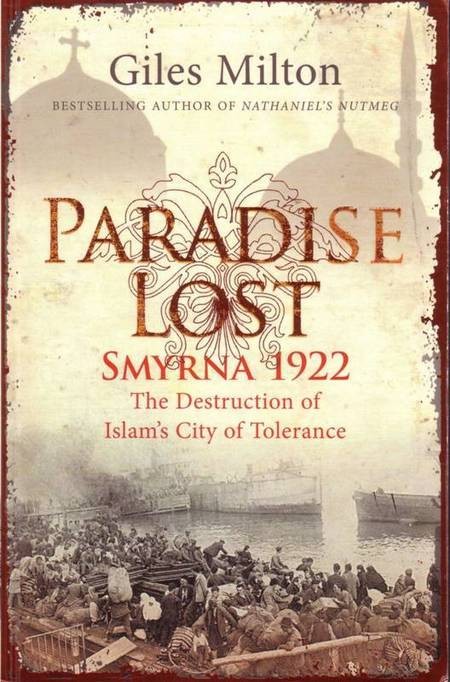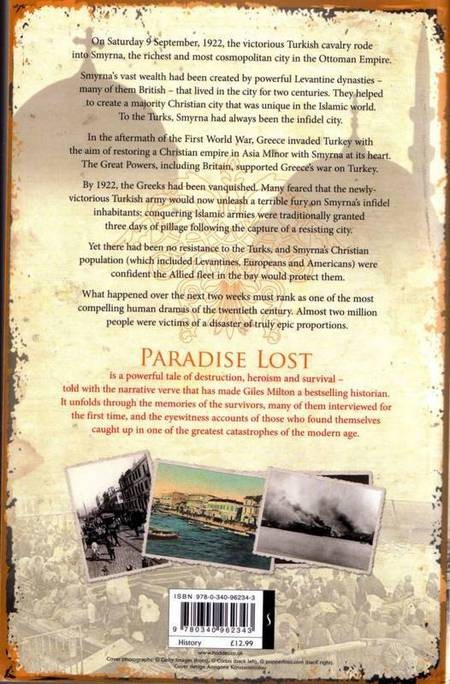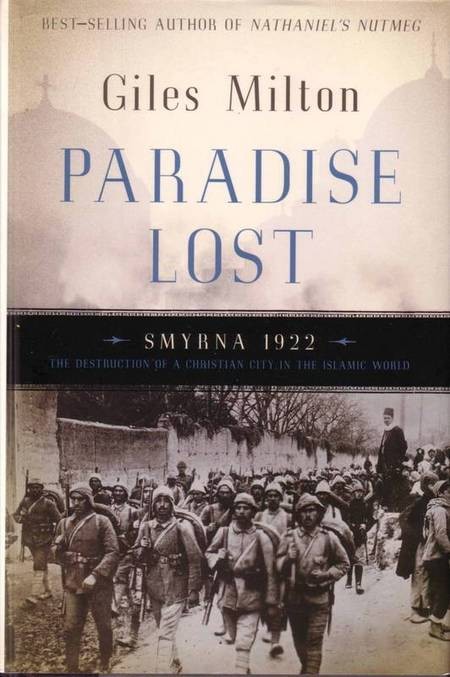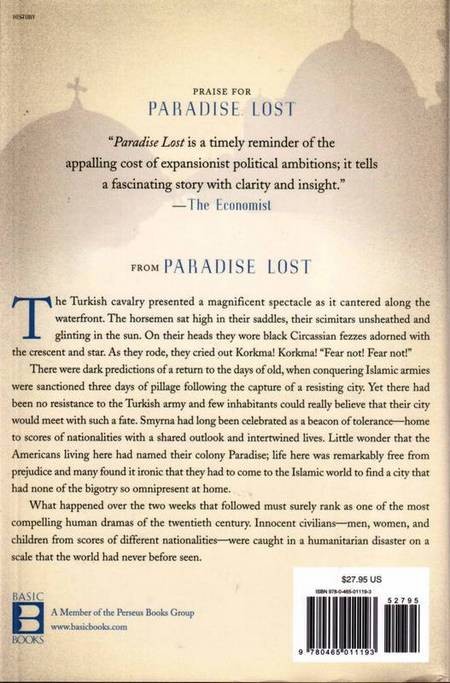Paradise Lost: Smyrna, 1922. The Destruction of Islam's City of Tolerance.
Author: Giles Milton
When Published: 2008
Publisher: Basic Books
Available: All major bookstores, Amazon.
Description: Hardcover & Paperback, 464 pages
Given the fact that so many grandparents and great-grandparents of the current generation of Kytherian's living in all parts of the world, were born, and grew up in Smyrna, this is a very important resource.

Front cover, paperback edition.
Paradise Lost: Smyrna, 1922 chronicles the Turkish invasion of Smyrna while warships of America and Europe bobbed in the harbor and made no effort to stop the slaughter of the city and its multi-national mix of people.
Utilizing reports from eyewitnesses and reports from the time Milton details the horrors of war rape, pillage, and murdering of innocents. The most nauseating part is that those aforementioned ships harbored there did not, in fact could not, help because of “orders” not to rescue the survivors.
The fate of thousands is unknown to this day because they disappeared into Turkey and were never heard from again. Over 100,000 Greek and Armenian civilians were flat-out murdered.
Smyrna, as well as most of her citizens, no longer existed. The name was changed to Izmir, and the rare survivors were forced into resettlement elsewhere. Were it not for the preoccupation with Europe post-World War I, this particular atrocity might have been averted.
In the aftermath, had more attention been paid to the divisive ideals that separated non-Muslim from Muslim, the current tragedy of fighting between those two groups might have been averted.
Paradise Lost is graphic in its honest and grotesque portrayal of battle, so it may upset the squeamish. However, this is an important book to read because it foreshadows the current situation and should make readers realize the importance of following a different course than the failed one from the past.
History lovers will love this book, and it should be mandatory reading for every politician in the nation.
Originally published on Curled Up With A Good Book at www.curledup.com. © Camden Alexander, 2008

Back cover, paperback edition.

Front cover, of the hardcover version of the book.

Back cover, of the hardcover version of the book.
From Greek News, the Greek-American weekly newspaper.
Telling about the Destruction of Smyrna, 1922
Posted on Monday, October 13 @ 11:49:34 EDT, on http://www.greeknewsonline.com/modules.php?name=News&file=article&sid=9259
by greek_news
New York.- By Vicki James Yiannias
“I was writing a novel which had one chapter set in Smyrna. When I started to research this chapter, I realized the need for a serious work of history about the city and its destruction,” Giles Milton, historian, journalist, and author of Paradise Lost – Smyrna 1922 – The Destruction of a Christian City in the Islamic World, told the Greek News, “There is a real hunger to know what happened and why. If my book helps to answer some of these questions then it will have fulfilled a purpose.”
The title of the book is not gratuitous, says the author, “To the Americans who poured into this most alluring of Middle Eastern cities at the bang of the 20th century, Smyrna seemed like paradise. So much so that they gave this name to their large and wealthy colony on the outskirts of the city.”
The critically acclaimed new book was presented by the Consulate General of Greece, the GreekAmerica Foundation, and Greek America magazine, to a large audience of Greek and foreign journalists and correspondents to the U.N., members of U.N. missions, Greek Americans, and philhellenes at the Greek Press and Communication Office in New York on October 2nd.
Consul General of Greece in New York Mrs. Agi Balta, introduced the book and Greg Pappas of the GreekAmerica Foundation, and Greek America magazine moderated the event. The author read abstracts of his book and took questions from the audience.
Paradise Lost recounts the days of prosperity and the days of horror in Smyrna -- known as the richest and most cosmopolitan city in the Ottoman Empire, and a majority Christian city that was unique in the Islamic world -- prior, during and after the war in the beginning of the 20th century.
“What happened there in September 1922 was to prove one of the most compelling human dramas of the 20th century, says Milton, “One million innocent civilians – men, women, and children from scores of different nationalities – were caught in a humanitarian disaster on a scale that the world had never before seen. One million people were trapped on the quayside – trapped between the sea, the Turkish machine gun posts and a devastating fire. But the fire – and the refugees – was only a part of the story. The destruction of Smyrna was to lead to a far greater crisis. Two million people were to find themselves caught up in a catastrophe on a truly epic scale.”
While Paradise Lost tells of the devastating destiny of the city of Smyrna and its people, it also provides an examination of political and religious relations at the time and it tells a fascinating, yet horrifying, story with clarity and insight.
Eyewitness testimonies, diary entries, and letters – some of them published for the first time – are all part of this meticulously researched, informed account. Paradise Lost is tells the story of the cityʼs burning from an unusual and interesting angle and perspective, from the viewpoint of the Levantine population in Smyrna.
Milton explains that he wanted to tell the story, where possible, from the Levantine point of view. Who were the Levantines, and why tell the story from their point of view? “These were wealthy Europeans who had lived in Smyrna for two centuries; they did not care who ruled the city as long as they could continue to make money. As such, they are impartial witnesses. From everything I read – both their own writings and those by Americans in the city – it is without question that Smryna was burned by the Turks.”
For many of the Greek survivors of the cataclysmic destruction of the city and its inhabitants, the story was too painful to tell, says Milton. “Children of the Greek survivors know less than others about the Catastrophe because their parents don't want to remember. I met many second and third generation Greeks in America who have almost no idea what their parents and grandparents experienced in Smyrna.
And the story of Smyrna is little known in Britain or America, Milton stresses, even though there are many elements that are extremely relevant to us today. “Genocide and ethnic cleansing – both of which occurred in Turkey at this time – are still with us – think of the Balkans and Rwanda”
The burning of Smyrna is part of the same chapter of history that was the Armenian genocide, 'Turkey for the Turks' was the slogan; in an age of nationalism, there were no longer any place for Turkey's 'troublesome' Christian minorities, says Milton. “It is perhaps ironic that Ataturk's republic, built along democratic, secular lines, was founded upon the expulsion of all the minority groups of the old Ottoman Empire.”
There are important lessons for us to be learned in this, says the author, who is interested in the idea of Smyrna as the prototype of our own modern cities – multi-ethnic and cosmopolitan. “It alarmed me to see just how quickly such a diverse city – where Greeks, Armenians and Turks had lived as neighbours and friends – could be destroyed. And there is also the question of great powers intervening in the affairs of a foreign country. In Turkey, Britain and America used a proxy (Greece) to carry out their foreign policy. Nowadays, those same to powers intervene with their own armies. If we had learned lessons from Smyrna, the mess in Iraq might never have happened.”
Having lived alongside each other as neighbors for centuries Greeks and Turks in Smyrna shared some cultural roots, says the author. “They had a shared culture, heritage, music, cuisine. Time and again in the Greek archives the Greeks speak of getting along extremely well with their neighboring Turks…you read of the different communities in Smyrna living alongside each other in peace and harmony; they played in the same football teams, went to each other's weddings etc. It was the rise of nationalism that caused the rupture in these harmonious relations. With the rise of nationalism, all this came to an abrupt end. Centuries of friendship was torn apart in the space of a few months.”
Milton explains that there are two groups in Turkey taking two different stands (on the history of the event: the liberal intelligentsia and the rabid materialists. Turkey is a divided country. The educated liberal intelligentsia is willing to speak about Turkeyʼs role in history. But the ardent nationalists refuse to admit that any wrongs were committed. According to most Turkish historians, Smyrna was burned by either the Armenians or the retreating Greek army. It is almost impossible to publish a book in Turkey saying otherwise.”
Will the book be sold in Turkey? “There is the infamous Penal Code 301 which forbids publication of anything that ʽpublicly denigrates Turkishnessʼ. My book does not do that...it simply tells the story of what happened in Smyrna. Several publishers turned the book down, although they thought it was fascinating. But now I have one publisher who believes it is very important that the story be known to a wider audience in Turkey.”